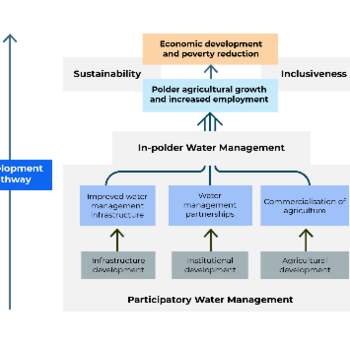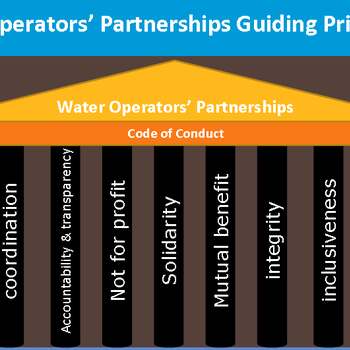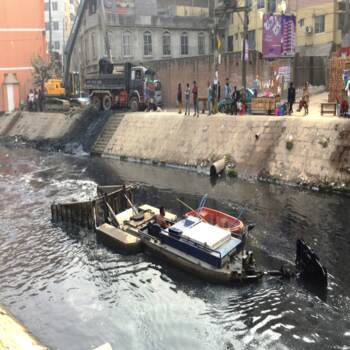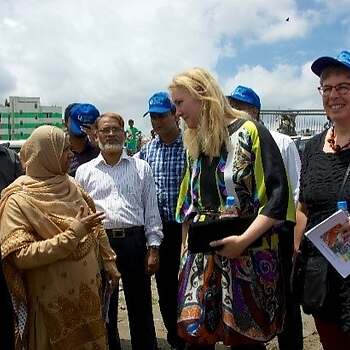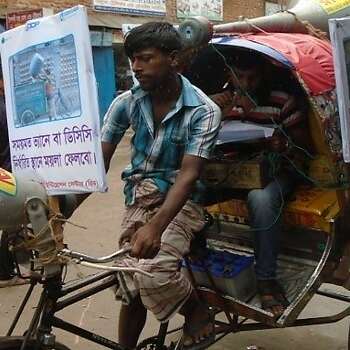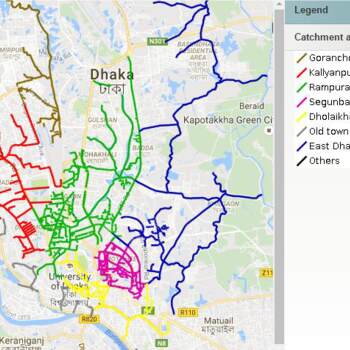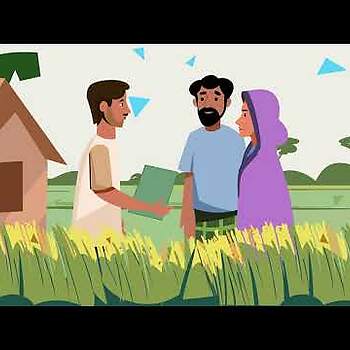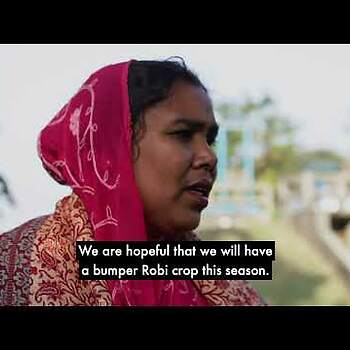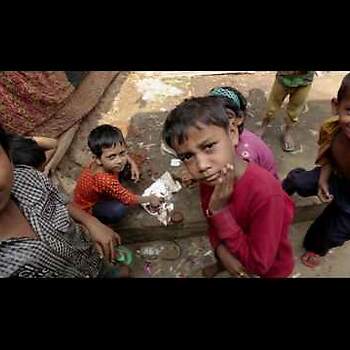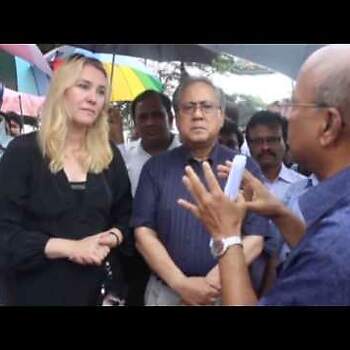Water Management: Integrated Water Resources Management (IWRM)
In this period, GoN continued to support water management projects in Bangladesh, for which an integrated approach had become standard. This means that multiple but related issues were addressed, with the use of interdisciplinary methods where applicable. One such project was the Blue Gold Program, in which water management infrastructure, water management partnerships and increasing agricultural production were addressed, while also devoting attention to inclusiveness and sustainability. See example below.
The Blue Gold Program (BGP) built on the experiences of many earlier water management programs in coastal areas, in particular the IPSWAM program (2003-2011). BGP was carried out from 2013 until the end of 2021, with the Bangladesh Water Development Board (BWDB) and the Department of Agricultural Extension (DAE) as implementing partners. The objectives of the program were to reduce poverty and to increase household income through appropriately targeted interventions for 185,000 households in the coastal districts of Patuakhali, Khulna, Satkhira, and Barguna; to help local communities to mitigate impacts of climate change; and to develop the local economies through diversified farming practices based on information about input costs and market prices, and supported by participatory management of local water resources. See the theory of change summarized in the diagram below.
A unique collaboration: the relationship between water management and agricultural production is obvious, yet BGP was the first investment project to be implemented by the two departments concerned, i.e. the BWDB and the DAE. Transformation from low-productivity smallholder agriculture towards higher-value production is a driver for better utilization of the water management potential within the polder areas served by embankments, canals, and sluices.
All documents used and produced by the Blue Gold Program can be found in the file library of the Blue Gold Program Wiki.
Other examples of Dutch (co-)funded water projects that were implemented in this period are CDSP - which was an integrated project from its start in 1994, and the South West Area Integrated Water Resources Planning and Management Project (SWAIWRPMP), which was jointly funded by GoB and ADB (2006-2022).
Another co-funded project with the ADB was the Flood and Riverbank Erosion Risk Management Investment Program (FRERMIP), 2014-2024. FRERMIP, executed by the BWDB, provides structural and non-structural flood and riverbank erosion risk management measures along the Jamuna, Padma, Ganges and Meghna rivers. The project first focused on high-priority areas, and will later extend to the protected reaches using designs adjusted to current riverbank erosion conditions and taking into account the possibilities to reclaim lost floodplain land. FRERMIP provides a more secure and improved livelihood for people living along the main rivers of Bangladesh. The outcome of the program is a reduced risk of flood and riverbank erosion. In the co-funded projects GoN usually provided the funds for the technical assistance for project implementation.
WASH
The National Strategy for Water Supply and Sanitation 2014 was formulated during this period. It was updated in 2019 to align with the relevant targets of the Sustainable Development Goals (SDGs), which were adopted by the UN in 2015 as a follow-up to the Millennium Development Goals. Particularly relevant are SDG 3 (Ensure healthy lives and promote well-being for all at all ages), and SDG 6 (Ensure access to water and sanitation for all).
The National Strategy is supported by two others: the National Hygiene Promotion Strategy for Water and Sanitation 2012, and the Pro-poor Strategy for Water and Sanitation Sector 2005 (which was updated in 2019). The latter highlights the link between poverty, access to WASH, and climate change by prioritizing those living in extreme poverty as beneficiaries of WASH interventions, such as those in coastal saline-prone islands, drought areas or households migrated due to river erosion.
The sustainability of WASH improvements is threatened by climate change. IRC, a non-profit organization based in the Netherlands that promotes resilient WASH systems, identified the following key challenges related to climate change for WASH in Bangladesh (source: IRC website):
- Developing disaster-resilient, affordable WASH technologies
- Developing a service delivery model which is adaptive to climate change
- Generating a common understanding for climate change among different ministries
- Developing capacity of professionals and increasing coordination among the sector.
In the period 2010-2020 several Dutch (international) NGOs received financial support from the Netherlands to implement WASH activities in Bangladesh, in particular the Max Foundation and the Bangladesh WASH Alliance, the latter a consortium of seven Dutch NGOs.
Max Foundation is an international NGO based in the Netherlands, working towards a healthy start for every child. From 2012-2016, the Max Foundation received financial support from the Netherlands to implement its first MAX WASH program; further Dutch funding was later provided to expand the program. This program integrated safe water, sanitation, and hygiene with nutrition and care. Max Foundation designs and promotes innovative solutions that are driven by communities, entrepreneurs, and local government to ensure long-lasting impact. Max Foundation Bangladesh adopts four strategic pillars:
- Implement integrated WASH, nutrition and care programs (Healthy Village approach) to tackle stunting and disease
- Influence stakeholders to maximize impact on child health
- Entrepreneurial, stimulating businesses to ensure sustainable impact
- Innovative and data-driven approach to (im)prove, continuously learn and drive decision-making
Bangladesh WASH Alliance, 2017-2022, is a program of the WASH International Alliance, which consists of seven Dutch members: Simavi, Akvo, AMREF Netherlands, RAIN, WASTE, IRC and Wetlands International. The program is implemented in seven countries including Bangladesh, where fourteen Bangladeshi NGOs are implementing partners. The WASH Alliance has been granted 59 million Euro by the Dutch Government to implement WASH programs to achieve WASH related SDG targets. The main objective is to ensure that people who still have no service or unimproved service for water supply and sanitation get access to inclusive and sustainable services. The alliance adopts three strategic pillars:
- Improved behavior-changing interventions: citizens will demand and are willing to pay for WASH services, and practice hygienic behavior within households, schools, health centers and public places.
- Improved WASH service delivery: strengthened capacity of WASH service providers to offer improved and sustainable WASH products and services at an affordable price. The private financial sector provides access to affordable credits for both households and service providers.
- Strengthened WASH governance: the government will take up its responsibility as duty bearer and create supportive policies and regulations for sustainable inclusive WASH services, held accountable by their citizens. It will also invest in monitoring the performance of the WASH service providers, including strengthening national monitoring systems and increasing climate resilience.
Target groups are public and private stakeholders and communities, with specific attention for groups that are threatened with being left behind in development, like women, girls, the elderly, disabled people and minorities, ensuring sustainable WASH services for all. The focus in Bangladesh is on hard-to-reach areas in the urban and peri-urban setting, such as slums.
MAR technology: Managed Aquifer Recharge (MAR) is piloted in Bangladesh coastal areas since 2012. This technology enhances the storage of fresh water (e.g. rainfall collected from roof tops in the monsoon season) in aquifers, in areas where the groundwater is saline or arsenic. This creates a floating fresh water lens underground, to be abstracted throughout the year. This research is supported by GoN, involving the University of Dhaka, Acacia Water (Dutch water consultancy), the Universities of Utrecht and Delft and UNICEF.
Private Partnership and WASH
In 2013 the GoN formulated the policy framework ‘A World to Gain’, which, among other things, promotes the involvement of the private sector. In the WASH sector, this is operationalized in two ways. NGO programs such as those described above often cooperate with local entrepreneurs for the provision of various services. These can include the production of hardware, the construction and maintenance of WASH facilities, supplying relevant technologies, providing training, and/or the provision of finance by private-sector financial institutions.
The second approach to the private sector is securing the involvement of Dutch companies with relevant WASH expertise. The example below describes the Water Operators Partnership (WOP) project implemented by Vitens Evides International (VEI), a consortium of two of the largest privately-run water operators in the Netherlands.
In the mega-city of Dhaka, with 18 million inhabitants, the Dhaka Water Supply and Sewerage Authority (DWASA) is preparing itself for the future. Rapidly declining groundwater tables, severe environmental pollution, climate change, deteriorating infrastructure and a rapidly growing and demanding population are forcing DWASA to improve its operations, invest in infrastructure, adopt new technologies and create a turn-around in its internal organization as well as in its customer relationships and stakeholder approach. With Dutch support, VEI established a Water Operators Partnership (WOP) with DWASA in 2012. WOP1 was carried out from 2013-2016 (total budget USD 7.3 million), WOP 2 was implemented from 2017-2021(total budget USD 4.1 million).
The objectives of WOP1 were to enhance DWASA's operational performance and management of capacities, and to support DWASA in providing WASH services to the urban poor. GoN -through the Netherlands Embassy in Dhaka- provided a subsidy for the project amounting to 65% of the implementation costs. The remaining funding came from DWASA (9%), VEI (24%) and Simavi (2%). In order to solidify the future of drinking water in Dhaka, DWASA & VEI have joined in a second Water Operators Partnership, WOP2, with a focus on sustainable management of the newly constructed network. WOP2 aimed to improve performance and operations and reduce system loss by enhancing the capacity of DWASA. Since 2022 the same WOP is part of a larger WaterWorkX programme between 10 Dutch water operators and 39 counterparts in 13 countries that is funded by the Dutch Ministry of Foreign Affairs.
DWASA also has to manage the increasing problems with flooding due to high rainfall and/or high river discharges that affect millions of inhabitants and businesses in the city every year. Apart from the rapid urbanization, inappropriate use of the storm water drains by the population and a backlog of maintenance of these drains exacerbate the situation. DWASA has decided to remedy the urban flooding problem by introducing new drainage technologies and strengthening customer relationships by changing the mindset of internal staff.
In 2013, the Urban Dredging Demonstration Project (UDDP) was established with the support of VEI and GoN with aim of reducing the floods in the Dhaka Urban Areas.
The main intervention areas of the UDDP were:
- Demonstration of dredging technologies for urban drains and dissemination of dredging expertise to the drainage department of DWASA
- Improvement of the capacity of DWASA to carry out drainage operations
- Development of stakeholder awareness and knowledge of the functions of the urban drainage system, and promotion of behavioral change to facilitate DWASA’s drainage and dredging services.
The project was completed in 2016. It was funded by DWASA (26%) and VEI (3%), with the GoN providing a subsidy for the remaining 71% of the total project costs.
Sources & Recommended literature:
Brochures / case studies Blue Gold Program:
- Water Management Organizations: Building sustainable partnerships for Participatory Water Management
- Blue Gold Program Success Story: Impact of water resource management at Amadkhali, Satkhira
- Blue Gold Program Success Story: Building strong and functional water management organizations: Kholsibunia water management group
Slidedecks Blue Gold Program:
- Water Management Organizations: Building sustainable partnerships for Participatory Water Management
